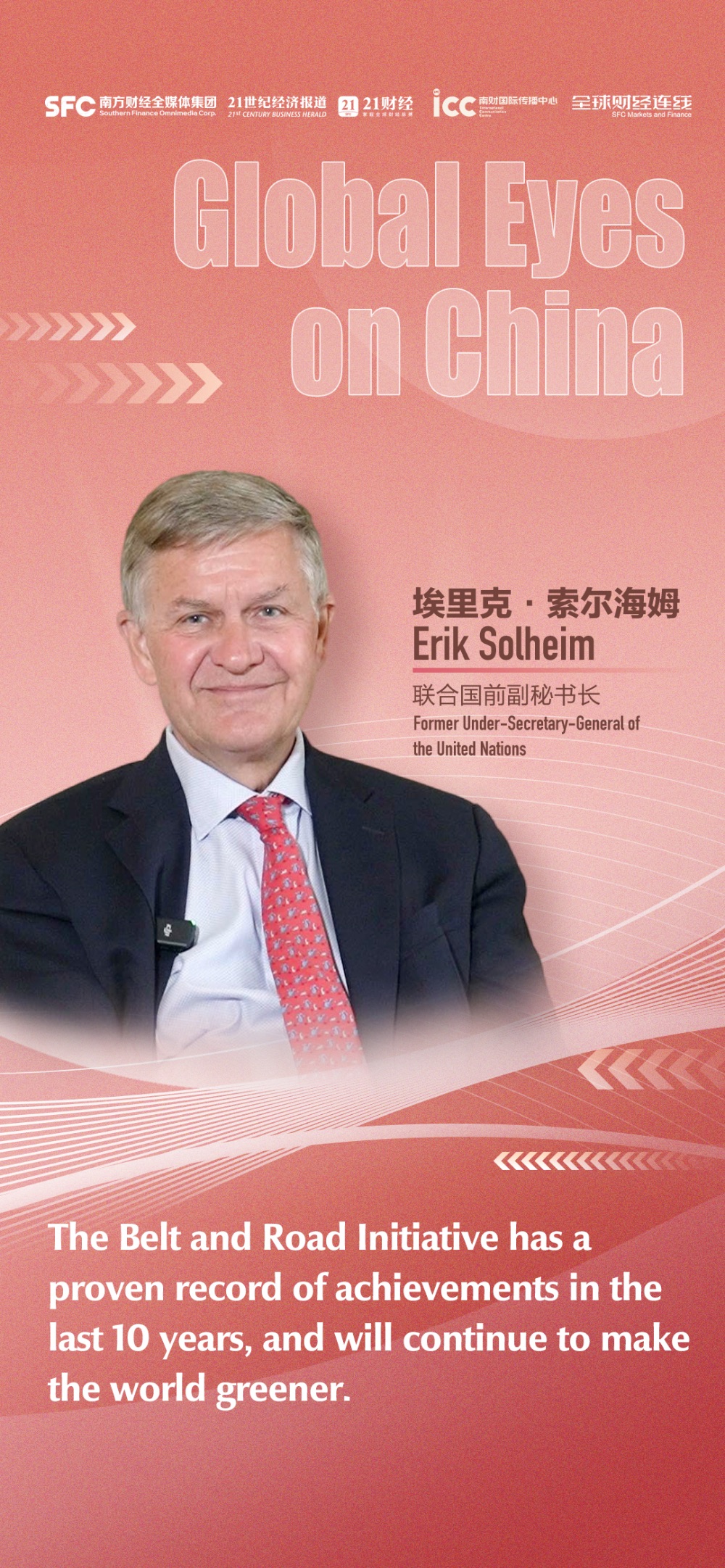南方财经全媒体集团首席记者 施诗 广州报道
At the third plenary session of the 20th CPC Central Committee, the Central Committee of the Communist Party of China (CPC) released the Resolution on Further Deepening Reform Comprehensively to Advance Chinese Modernization. The resolution emphasized the Belt and Road Initiative (BRI), stating: "Improving the mechanisms for high-quality cooperation under the Belt and Road Initiative." This underscores the commitment to enhancing cooperation and developing more effective frameworks to support the BRI's objectives.
In the first quarter of 2024, the Belt and Road Initiative has made a series of new progress. In terms of cooperation in emerging fields, six memorandums of investment cooperation in digital, green, and blue fields were newly signed with countries such as the United Arab Emirates, Angola, and the Maldives.
“China is now the leader in solar, in wind, in hydro-power, in high-speed rail, in electric batteries. And this creates jobs, which creates prosperity in China while adding to a much greener future for humanity.” Erik Solheim, former UN Deputy Secretary-General spoke highly of China’s contribution to green development when having an exclusive interview with the SFC journalist.
So far, China has signed more than 230 cooperation documents for the joint construction of the Belt and Road with more than 150 countries and 30 international organizations.
Erik Solheim indicated that “The Belt and Road has a huge promise to help the world develop and for some outreaches between nations”. He emphasized that China has the role of a potential peacemaker in the future, which will benefit the development of the world as a whole.
SFC Markets and Finance: How do you evaluate the achievements of the Belt and Road Initiative over the past decade?
Erik Solheim: There have been immense success for the Belt and Road over these 10 years. Millions of jobs have been created, millions of people have been brought out of poverty, and recently the Belt and Road also turned very green.
China can not do well unless the world is doing well. And that's linking Chinese development, Chinese prosperity, Chinese green development to global development. That’s so essential because what every state should do in the 21st century is that we need to work together. Nothing that is significant we can solve just one nation alone. Let’s work together for economic prosperity, bring everyone out of poverty, solving the climate challenge, creating a world that will take much better care of the environment.
SFC Markets and Finance: What progress has there been in the Belt and Road Initiative in recent years?
Erik Solheim: And what we have seen is a major transformation. The early days of the Belt and Road, there were a lot of coal investments, oil and gas investments. But then 2 years ago there was a watershed moment and that was the Chinese decision to stop all overseas coal investment. And then you don't do coal investment. What will it be? Solar, wind, hydro... And interestingly enough, all those nations we had discussed coal investments with China in the past, now came up and said we don't need coal any longer. Let's go solar. Let's go wind. Let's go hydro. So Indonesia, Pakistan, Bangladesh, Kenya, Ethiopia, all wanted to go into renewable energies.
The Belt and Road is now very green when it comes to the energy. And there is one big area, which is connectivity. China has established one of the most wonderful railroads in the world in Kenya, from Djibouti to Ethiopia in Africa, from Laos to Kunming closer to home. Recently also opened from Jakarta to Bandung in Indonesia. All these are green corridors making sure that people and goods can move more on trains rather than on roads.
SFC Markets and Finance: How should the international community view current green development?
Erik Solheim: Number one, we should see the opportunities rather than just looking to the problems. A lot of people speaking as if going into the green is a problem. No, it’s not. It’s an enormous opportunity for better health, caring more for Mother Earth and more jobs and prosperity. When China, for instance, now have moved straight into electric cars, 60% of the global market for electric cars is in China. BYD from Shenzhen was just passing Tesla as the biggest producer of electric cars in the world. It's good for the environment, but it's also very good for the Chinese economy and for prosperity.
China is now the leader in solar, wind, hydro-power, high-speed rail, and in electric batteries. And this creates jobs, and that creates prosperity in China while adding to a much greener future for humanity. It will be very positive, creating more jobs, more prosperity, more connectivity. This is good to bring everyone out of poverty.
SFC Markets and Finance: What kind of progress has China made in green development, and how did it make the world greener?
Erik Solheim: The Belt and Road is now a major force for renewable energies. Chinese companies are the very leader in every green sector. BYD when it comes to electric cars, but LONGi from Xi’an is the number one solar company in the world. Goldwind is the number one company in the wind sector. China already has done so much for the green development and can do even more in the future. And these green corridors which are established, in the next decade they can be taken further.
For example, if you go to the city of Mombasa in Kenya, it’s a very poor and somewhat rundown city. Then you go to the station of the Mombasa-Nairobi Railway, which is built by China, and it's like, wow, it's an oasis. It’s green, it’s clean, it’s well-functioning. Everything is superb and it shows the potential of Kenya for the future. But if it can be continued to Rwanda, Burundi, Uganda, in the Africa, these wonderful, beautiful nations, we get more tourists and they'll get much more access to the world market and develop much faster. That's just one example.
Another one is Southeast Asia. China has just constructed a road in Indonesia and Laos. In the future, it may be a very fast Chinese speed train from Singapore through Malaysia, through Thailand, also including Myanmar and Laos, and entire Southeast Asia will be connected. And in 10 years, I'm sure you will be able to go from Singapore to Beijing by train in 24 hours.
Since I lived for a number of years in Kenya, I have to say I was very fond of the Mombasa-Nairobi railroad. Not only because it provides a wonderful environment-friendly way of transport, but also because it's built into the landscapes, in a good way I mean. There are bypasses, so that elephants, giraffes and zebras can pass under the rail or at the bridge over the rail and not be harmed by the rail. Of course, it's much more modern, and then did much more care for the animals.
SFC Markets and Finance: What potential does the Belt and Road Initiative still hold in promoting green development of the world?
Erik Solheim: Maybe in the future, we can even have the same Chinese high-speed rails all the way from China to Europe. I think then we'll take a couple of days to go from Europe to China by train. In the meantime, this is wonderful for exports of different commodities since there are numerous trains going from China through nations like Kazakhstan to Europe every day, and bringing commodities in both directions and bringing trade, of course. What is heavy and big we go by ship, but smaller quantities which are urgent can now go by train.
And Central Asia is also a very important region for the world. And of course they really want to be playing the role as a hub for this connectivity. Another area where China and Central Asia can cooperate more is fighting the desertification. China and particularly Inner Mongolia is probably the best in the world, when it comes to technologies for fighting deserts greening, tree planting. It has done wonderfully many of these technologies are so green, and that technologies can be discussed in Central Asian nations which struggle with the same (problems).
SFC Markets and Finance: Looking ahead, how can we enhance the global cooperation through the Belt and Road Initiative?
Erik Solheim: I think the Belt and Road has a huge promise to help the world develop. Also some outreach between nations. I mean like 150 nations have made agreements on the Belt and Road. There's still some criticism from the West claiming that the Belt and Road is negative. Well, if it was negative, why did 150 nations completely, voluntarily, embrace the Belt and Road? Why? Because they really want to work with China for development.
There was a force for stability. We need to remember that the vast majority of the nations in the world are not at war. We have a horrible war in Ukraine. We have a horrible conflict between the Israelis and the Palestinians, but nearly all nations are at peace and they will long to see development. They don't want to be this disturbed by these wars in their development parts. They want to see everyone coming out of poverty, everyone being educated, everyone getting vaccines for future pandemic. And for that development of the rest of the world, the Belt and Road can contribute to. China of course also has a role to play as a potential peacemaker in the future. China can play a role calming the waters and creating a more peaceful world, which benefits development.
SFC Markets and Finance: What are your prospects for the future trajectory of the Belt and Road Initiative?
Erik Solheim: Since the Belt and Road has achieved so much in the last 10 years, it has a proven record of achievements and success, it’s highly likely that it will also be able to do more and better in the future. And the two main areas, I think are these kinds of green corridors connecting the world, and renewable energy making the future green.
Look, I mean the entire world understand that the Chinese civilization is maybe the oldest, for sure one of the most splendid of all civilizations. So people not only want technology from China, but also want to tap into Chinese history, culture, traditions, send tourists here, receive Chinese tourists to their nations. So people to people contact is also very essential. For whoever is interested in history course, China is the most fantastic place.

策划:于晓娜
监制:施诗
责任编辑:李依农
记者:施诗 李依农 杨雨莱
制作:李群
新媒体统筹:丁青云 曾婷芳 赖禧 黄达迅
海外运营监制: 黄燕淑
海外运营内容统筹: 黄子豪
海外运营编辑:庄欢 吴婉婕 龙李华 张伟韬
出品:南方财经全媒体集团

















